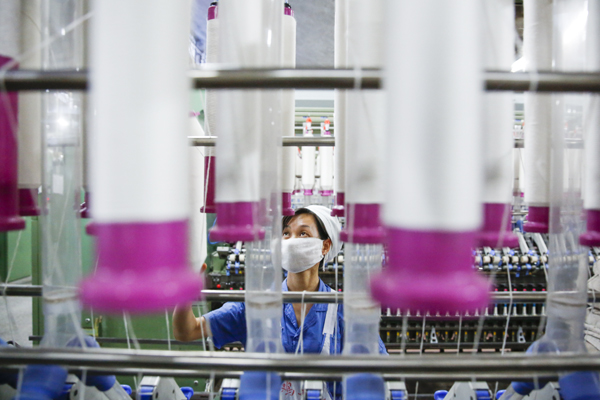SOEs stress financial risk control
 |
|
A worker operates a machine at a textile company in Baoji, Shannxi province. [Photo/Xinhua] |
Country highlights deleveraging and capital structure optimization
BEIJING-Lowering the leverage ratio of State-owned enterprises, which are responsible for more than half of corporate debt, will put China into the fast lane of preventing systemic financial risks.
SOEs will take the lead in controlling debt level and containing the leverage ratio, and further accelerate the clearing of "zombie enterprises," the Xinhua-run Economic Information Daily reported, citing a source with the State-owned Assets Supervision and Administration Commission.
At the end of Q1, the leverage ratio of non-financial companies rose to 157.7 percent from 155.1 percent at the end of last year, according to the National Institution for Finance & Development. SOEs were responsible for about 60 percent of total corporate debt.
To defuse risks from fast corporate debt expansion, China has put deleveraging of SOEs high on its agenda, according to a national financial work conference earlier this month.
"The commission has attached great importance to risk control in central SOEs, and risk prevention provides a solid foundation for stabilizing growth," said Shen Ying, SASAC chief accountant.
To reduce the leverage ratio, SASAC has encouraged enterprises to optimize capital structure via public offerings on the stock market, and supported efforts in asset securitization, she added.
As an important means to reduce SOE leverage, debt-to-equity swaps have been accelerated, allowing companies with long-term potential to exchange their debt for stocks, SASAC said.
So far, 12 centrally administered SOEs, including China Baowu Steel Group and China First Heavy Industries, have signed such swap agreements, which will help them deal with bad assets and reduce their debt burden.
Local SOEs are also making full use of this approach. Two coal companies in North China's Shanxi province in March signed debt-to-equity swap agreements with the local State-asset regulator and China Construction Bank, worth a total of 20 billion yuan ($3 billion).
The deal will not only reduce their leverage ratio, but also facilitate their industrial transformation and upgrading.
Some companies have already received the funding from such swaps, including Huaibei Mining Group and Henan Energy and Chemical Industry Group.
China should also intensify efforts to clear out zombie enterprises, or weak businesses that are not viable, usually in industries with severe overcapacity and kept alive only with aid from the government and banks, according to the financial work conference.









